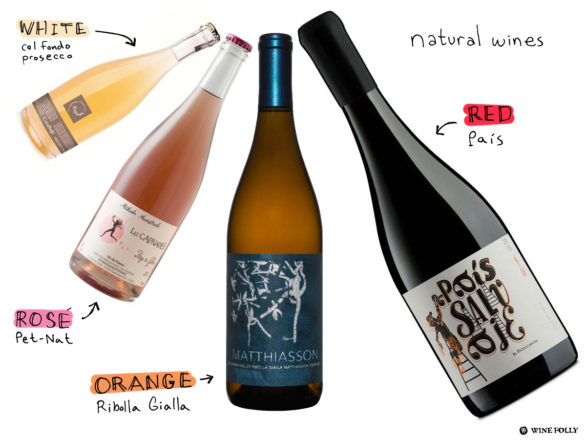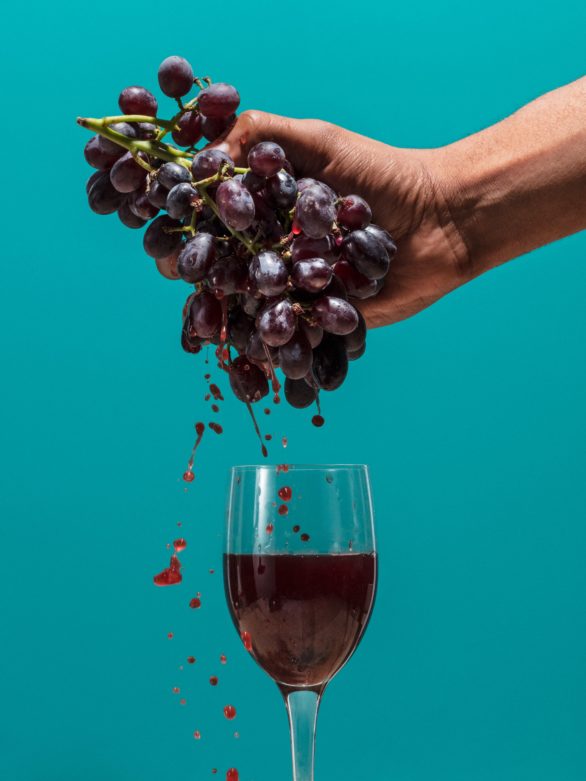April 2021 | Education, General, Guest Blog
‘Natural wine is not a style’, Explained by Jesse Walters
Okay my friends. Repeat after me: ‘Natural wine is not a style’. Of all the things we might debate about natural wine, I am of the firm opinion that it exists on a spectrum that includes a huge range of expressions. Natural wine, so far as I’ve experienced it, is simply a set of practices and a community of like minded individuals. I only bring this up, because I am hoping to answer some fundamental life questions, like: which bottle do you bring to family dinner?

Credit: Wine Folly ‘What Really Is Natural Wine?’ (https://winefolly.com/deep-dive/really-natural-wine/)
I am in the position of asking these questions because I have been presented with a couple of wines that have really made me think. Before I discuss them, I hope you will let me indulge in one other idea regarding what we consider beautiful, and how this relates to our appreciation of ‘natural’ wine. If you’d like to get to nuts and bolts, just skip this next paragraph.
The very first viewing of Jackson Pollock’s (yes, that Jackson Pollock, I promise I’ll tie this back in) “lavender mist” was a revelation. Nothing had ever been done like it before. The scale of the painting, the lack of anything approaching representation, the sheer audacity of it, etc. etc… the point is that it was completely unlike anything we’d ever seen before; BUT, it is precisely the novelty of this revolutionary eruption of the sublime that leaves it subject to the possibility of dying. We can only see the painting ‘for the first time’ once. What happens on your 10th visit to the gallery? After there has been a movie made about the artist? J.M. Bernstein put it best, when he said he reached a moment with “lavender mist” where, “I knew the painting so well, I could hardly see it.”
And so, perhaps it is also possible to know the wine so well, you can hardly taste it. It is undeniably exciting to try an orange wine for the first time, a pet nat, a semi carbonic crusher from the Loire – also, the unpredictable nature of natural zero/zero wines has a level of unpredictability and ‘life’ built into the expression – but, how does it fair when you approach the last bottle from the case? Or, even just the last glass from the bottle? And what about that first, hedonistic, ripe, velvety smooth, rich and delicious wine you had? Was that simply a naive appreciation?
As a ‘wine guy’, I like transparency of flavour. I want a wine I can see through in the glass, and flavours that will be clearly delineated on a long mouth watering finish. BUT – I get it. Sometimes you want something rich and ripe and warming? Maybe your family won’t find that wine complex, they’ll just find it acidic? Maybe you want something with the same ethos of sustainability, integrity, and authenticity of expression – but, done in a style someone else can enjoy?

Credit: GQ ‘A Beginner’s Guide to Natural Wine’ https://www.gq.com/story/how-to-drink-natural-wine
As a sommelier, I’ve also had the pleasure of seeing people care as much or more about what’s going on ‘beyond the glass’ with wine making. There are issues of social justice, sustainability, misogyny, predatory capitalism, migrant labour – all of which really, deeply matter when consumers want to make a conscious choice about where their money goes.
And, this is where we come to La Stella’s wines. Drinking Italian grape varieties grown somewhere else is always exciting. Cabernet Sauvignon, Merlot, Pinot Noir – those grapes travel so much, why not Sangiovese? Maybe Sangiovese will have a huge role to play in our very near future of short hot growing seasons and water scarcity? Maybe it matters to you that they’re a small estate with a female wine maker and a deep commitment to sustainability? One thing I can tell you: their Classico D’Osoyoos is like biting into a ripe dark cherry with a lingering cocoa finish, the wine is quite full, but the flavours linger and unpack themselves on a beautiful vein of acidity; and their Fortissimo is equally bold and ripe with a little more of that classic Bordeaux framework. These are wines with no funny business in the vineyard or winery, they’re just picked a little later and grown in a slightly hotter climate than some of us wine geeks are used to, and the wines are stylistically slightly riper and more opaque in the glass. These are rich hedonistic wines, (in the opinion of someone who drinks mainly from the Loire, Chablis, Beaujolais, and Champagne), but seeing them put a smile on the faces of the people I care about? THAT is the most sublime moment I can think of, and that generosity of style is something that in my experience does not have the same precariousness or diminishing returns as sublime novelty. Don’t get me wrong, I want all of you to keep pushing the boundaries, but there is undoubtedly a time and place for no other wines than these.
——————————————————————————–
Jesse Walters is a WSET diploma holder, winner of the Wines of Germany prize for receiving one of the top over-all marks on the diploma in North America, a French Wine Scholar, Italian Wine Maestro, Premier Cru Service professional, headed an all-natural wine program that won two platinum awards (which remains the only two times an all-natural wine program has received that award), is a bit of an evangelist for open-door, inclusive, welcoming tasting and study groups, can currently be found at Dachi Restaurant, and is basically someone who just wants to read smart books and workout.